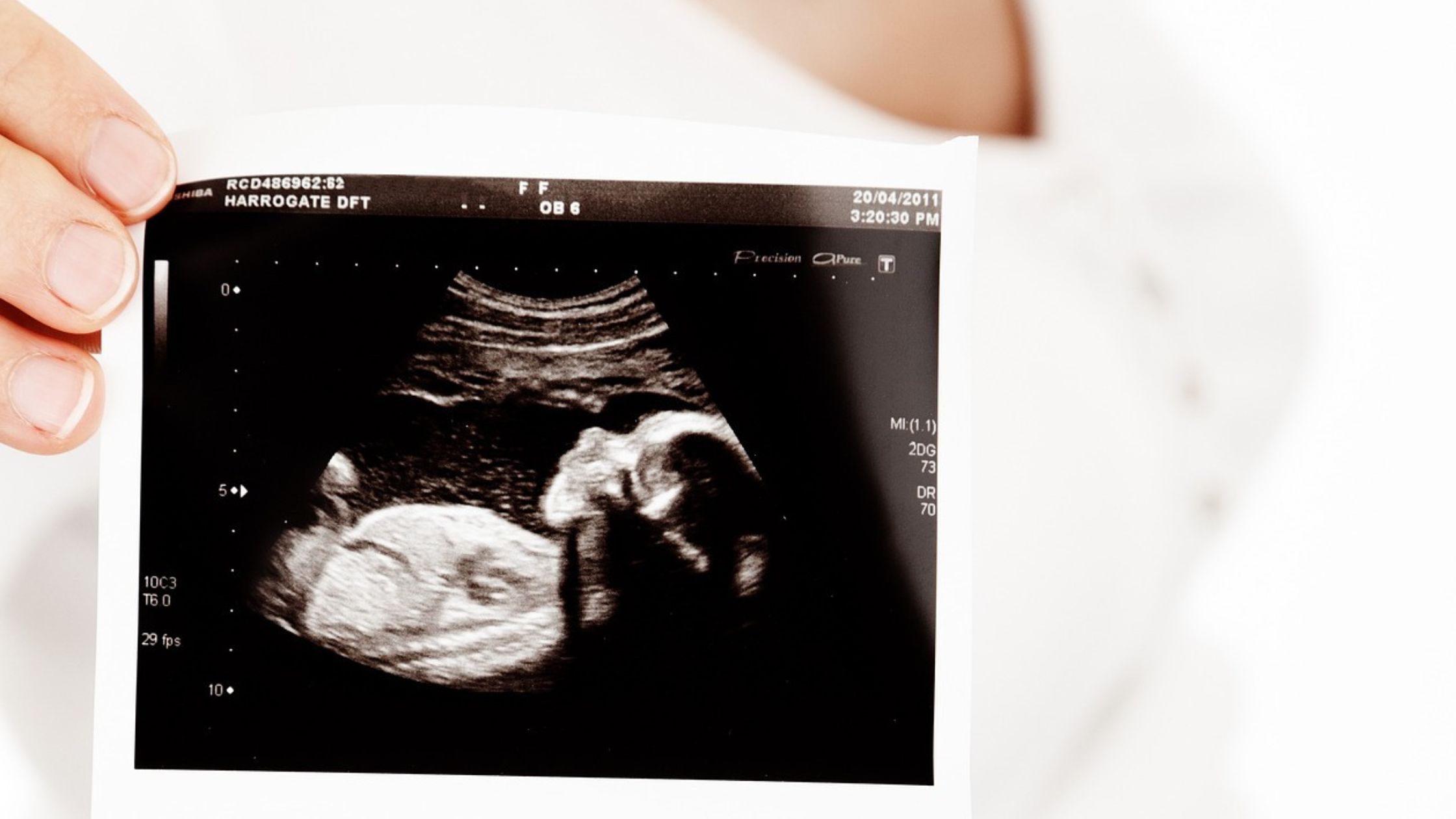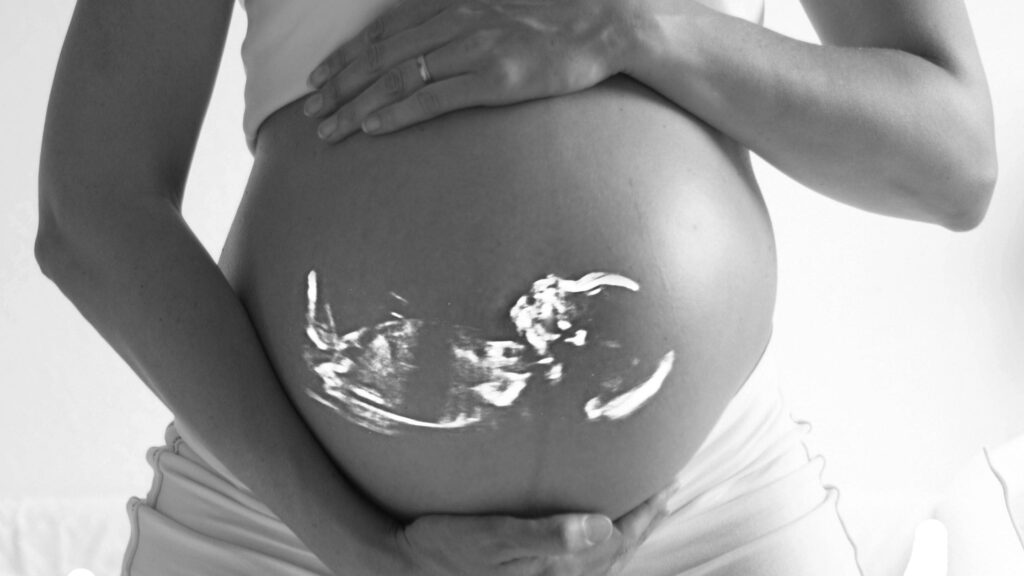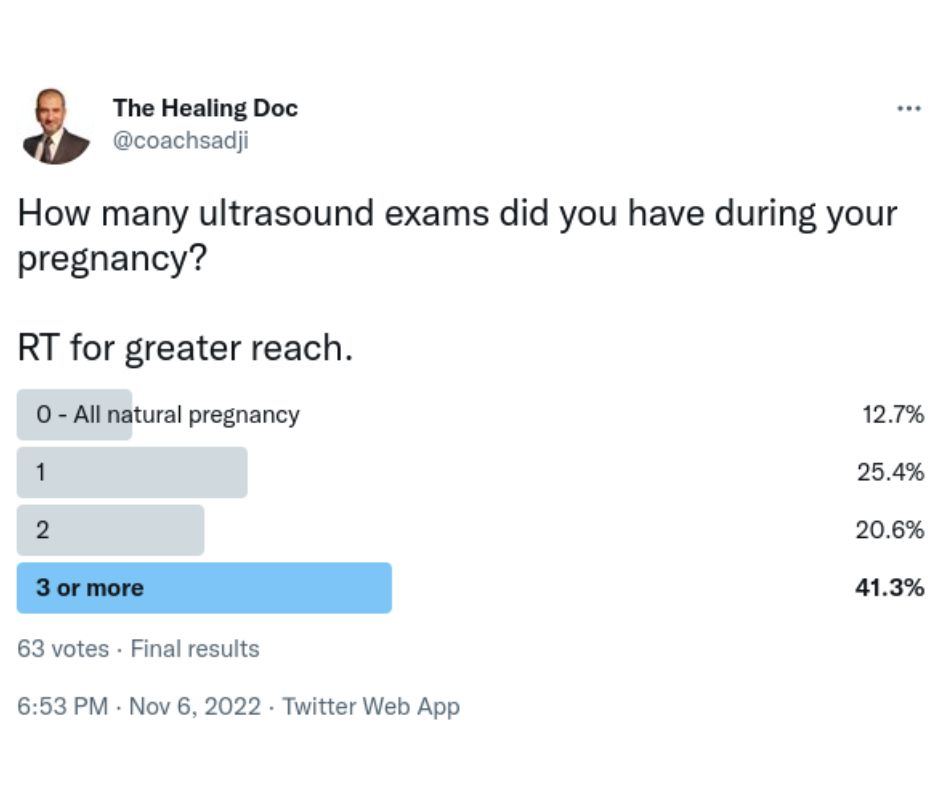Are ultrasounds safe during pregnancy?

Today it is a common belief that ultrasounds are safe. A few decades ago, X-rays were used as a diagnostic tool in pregnancy. They were thought to be safe, until they weren’t. Then ultrasounds replaced them and have become the prenatal diagnostic procedure of choice. Today, multiple ultrasound exams are standard routine in obstetric practice, even in low and no risk pregnancies
Pregnancy ultrasounds are the “norm” today
I ran a 24 hour poll on twitter, asking women how many ultrasound exams they had during their pregnancies and the results were not surprising.
The majority of the respondents had 3 or more ultrasounds scans, and only 12.7% did not have any.
Despite the small sample size, these numbers could be representative of the general population since this practice is widely used and never really questioned. It has become socially unthinkable to carry a pregnancy to term without multiple ultrasound scans.
The real questions
- Do you really need ultrasound exams when you are pregnant?
- Are ultrasounds safe for both the mother and baby? Are there any known risks?
- How many prenatal ultrasound exams should be done?
- Is it safe not to have any ultrasound exam throughout the entire pregnancy?
Do you really need ultrasound exams when you are pregnant?
First, the diagnostic ultrasound market revenue is “only” (sarcasm) a few billion dollars, and growing. The exam lasts about 20 minutes and costs between $200-$300. I don’t know about you but I see an incentive in pushing for an ultrasound exam.
For an expecting mom, what is the purpose of having multiple ultrasound exams throughout pregnancy? And do you really need that gender reveal appointment?
The most obvious reasons presented by doctors are:
- to determine the gestational age and the approximate due date,
- to make sure the baby is developing well, and
- to detect any anomalies early on.
Remember, ultrasound scans are not compulsory, and you have the absolute right to decline them. It is your body and your baby.

Are ultrasounds safe for both the mother and baby?
The problem with new technology is that it represents a lot of money for its creators and investors. Because money talks, policy makers, under the influence and pressure of lobbyists, often, if not always, declare new technology safe until proven otherwise. After its deployment, the gatekeepers with a vested interest will do all they can to deny any link (correlation or causation) between the new technology and the increased incidence of health problems or deaths.
I think we can agree that every medical procedure has inherent risks whether we know them or not. Despite the fact that animal and cell studies identified clear hazards, doctors continue to encourage and prescribe multiple prenatal scans, because “science” has yet to confirm said hazards in human studies.
On the other hand, ultrasound studies on humans are considered unethical and therefore not allowed. This means that for now, all we have is the absence of evidence of harm, argument that we often hear about technology, don’t we? Wi-Fi, cell phone towers and mobile phones, are good examples.
However, does it make sense to ignore the evidence of harm shown in animal studies, while at the same time:
- banning studies on humans under the pretext that they are unethical,
- authorizing or rather encouraging their use on the general population, including pregnant women, and
- declaring ultrasounds safe for humans because there is no evidence to the contrary?
Furthermore, was it a coincidence when the FDA raised the limit for machine ultrasound intensity levels by a factor of eight just when all funding for human studies ended in 1991?
The elephant in the room: are ultrasounds safe or is there any evidence that they cause harm to human fetuses?
Historically, all new technologies that involved devices or equipment that emit frequencies, waves, radiations, etc. had a negative impact on human and animal health. That includes electricity, radio frequencies, radar, electromagnetic fields/radiations, etc. For greater details on this topic, I strongly suggest reading Arthur Firstenberg’s book “The invisible rainbow”.
This book traces the deployment of electricity in our civilization, in terms of its interaction with living organisms, from its initial discovery in the 1740s all the way to our time, and even projected into the future.
It is true that diagnostic ultrasounds do not emit radiation like X-rays do. But they do emit mechanical vibrations from sound waves that travel through the skin, fat and organs, and therefore through water. These sounds are outside the range of frequencies that we humans can hear (20 Hz – 20 KHz), according to the available data.
But do they affect the water molecules, cell membranes, bacteria, or even baby’s hearing while swimming in the amniotic fluid? Is there an impact on blood vessels, the connective tissue, the glandes, the brain?
Health Impact of Ultrasounds on the Human Fetus
Chinese researchers conducted human studies between 1988-2011 and demonstrated the hazards posed by ultrasounds to the human fetus.
Approximately 50 in-utero studies took place over two decades in China and included over 2700 pregnant volunteers. These women underwent ultrasound exams before a scheduled abortion. Subsequently, the researchers examined the organs of the aborted fetuses in the laboratory using biochemical techniques and/or electron microscopy.
To be perfectly honest, I do not really trust this type of lab analyses because of the chemicals and manipulation used in the process, which is not the natural habitat of the examined tissues. That said, I am reporting the findings of modern medicine’s own published data, which happen to support my stance on the subject.
Medical critic and researcher, Jim West, has brilliantly gathered the published evidence confirming the suspected hazards of ultrasound scans in his book, Diagnostic Ultrasound: A New Bibliography, Human Studies Conducted in Modern China.
Based on these 50 human studies, prenatal ultrasounds contribute directly or indirectly to the following conditions:
- Autism Spectrum Disorder
- ADHD
- Genetic damage, inheritable by future generations.
- Jaundice
- Childhood cancers, e.g., leukemia, lymphoma, brain, etc.
- Chorioamnionitis (inflammation of the maternal-fetal junction)
- Personality anomalies
- Ophthalmological diseases and various malformations
- Skin diseases such as eczema
- Allergies

Human studies were also conducted in other countries and Moyano et al. (Mar 2022) gathered the findings in their literature review. Here are a few quotes from the publication:
“it should always be considered that ultrasound waves continuously induce thermal effects, and in short but repetitive pulses stimulate cavitation and are associated with cell damage. It is demonstrated that when a tissue with suspended cells is exposed to an ultrasound wave, this wave can produce lysis of those cells”
“10 microseconds of exposure to repeated pulses of ultrasound at a frequency of 100 Hz for 3 min at 1.2 MHz could cause bleeding from fetal blood vessels.”
“Campbell et al. exposed the ears and head of healthy fetuses to ultrasound for 3 min, 10 s to 20 s off, using a scanner equipped with 2 MHz, and compared the results with other fetuses without such exposure or with continuous exposure, thereby observing that fetal movement increased with exposure to the ultrasound. They observed that children who had been exposed to ultrasound more often during pregnancy took longer to speak.”
“Basta et al. observed that in single-layer endothelial cells, ultrasound of variable durations between 1.3 MHz and 2.6 MHz with a mechanical index of 1.5 produced increased intracellular oxidation of endothelial cells in addition to endothelial damage under exposure times greater than 30 s.”
The evidence is therefore irrefutable, confirming that prenatal ultrasound scans always harm human babies in some way.
How many prenatal ultrasounds should you do?
Professor Ruo Feng, of the Institute of Acoustics, Nanjing University, summarized many of the human studies with regard to the devastating effects of prenatal ultrasounds, recommending the following:
- Ultrasound should only be used for specific medical indications.
- Ultrasound, if used, should be strictly limited to the smallest dose principle i.e. the lowest intensity and shortest scan time that achieve the necessary diagnostic information.
- Ultrasound for the identification of fetal sex and fetal entertainment imaging should be strictly eliminated (emphasis added).
- For the best early pregnancy (1st trimester), avoid ultrasound. If unavoidable, minimize the scan. Even later, during the 2nd or 3rd trimester, limit the exam to 3 to 5 minutes for sensitive areas, e.g., fetal brain, eyes, spinal cord, heart, etc.
- All ultrasound training should include information on the biological effects of ultrasound.
Is it safe not to have any ultrasounds throughout the entire pregnancy?
Pregnancy and child birth aren’t new, are they? Diagnostic ultrasound machines are a relatively new technology, aren’t they? Women have carried pregnancies safely and delivered healthy babies for thousands of years, and therefore, it is safe and wise to avoid ultrasound scans throughout pregnancy, unless there is an absolute medical necessity. If this is the case, you must choose a highly skilled examiner and they must follow the above recommendations.
And again, you are in charge. It is your baby, your body, and no doctor can force or coerce you to undergo any medical procedure without your express consent.

In conclusion – Words of wisdom
If the main purpose is to ensure the fetus is developing well, why don’t we start by educating the future mother on how to prepare for pregnancy. The body must be fully ready to welcome and grow a baby safely.
If you are overweight or obese, or have any chronic “disease”, you must first take care of your health (body & mind), optimize your nutrition and reverse any health problems before getting pregnant. Doing so will ensure a healthy pregnancy, without ever needing any test, ultrasound scan or a visit to the doctor. All you will need is an experienced holistic midwife and a doula.
High risk and complicated pregnancies always happen in women who suffer from existing health conditions and are more likely to have a premature delivery. In this category, I also include the presumed healthy women.
Planning a pregnancy?
I can help you better prepare your body and mind, to ensure a more enjoyable pregnancy, delivery and breastfeeding journey.




